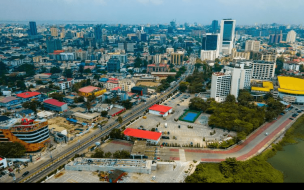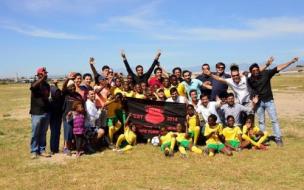South Africa struggles with its candidate pipeline for graduate business school programs, but recent data shows things are starting to change
The history of inequality in South Africa’s education system has left behind countless challenges relating to higher education. It’s also had a knock-on effect for students targeting graduate management education (GME) as a viable option after school or university.Problems start at the very beginning—the quality of primary education in the country is ranked 116th out of 137 in the World Economic Forum’s Global Competitiveness Report 2017/2018.
The ripple effect of poor education into secondary school, and above, correlates with a student body inadequately prepared to sit tests like the GMAT—needed for most business schools.
Only 4,727 people in the whole of Africa took the GMAT in 2017—compared to almost 80,000 in the US and over 18,000 in Western Europe—according to the Graduate Management Admission Council’s (GMAC) latest GMAT Geographic Trend Report. In South Africa, 677 people took the GMAT in 2017; only 49 scored over 700. Then there are the issues of affordability and a lack of awareness around how to actually get to business school.
“In general, [South Africans] have more rote learning where they’re asked to memorize information, and there aren’t opportunities for the kind of discussion and debates we see in western education,” says Ron Sibert, GMAC market development director for Africa.
“There are not opportunities in programs to incorporate reasoning and problem solving, which is why the GMAT may pose difficulty.”
The GMAT is a test of skill, not of knowledge, Ron affirms. Thus, practice is key when it comes to smashing the heights needed to impress admission directors. The long-term goal for GMAC in the region, Ron continues, is to make a difference in countries that have a specific need to manage students through programs that will not only benefit them, but the economy as a whole.
“I’m an advocate of the value of graduate management education in general,” Ron adds, “but, that’s not a presumption over there.
“We need to grow the pipeline. There’s not a lot of awareness among the group of how existing programs like an MBA can have an impact on their career pursuits.”
The South African government has devised a plan—the National Development Plan 2030—as a response to the stark poverty and social inequality that is prominent in the country. Education is of course one of the strongest pillars within that plan. It is, after all, a strong dictator of social mobility.
The challenge to achieve equality is a battle against history. Decades of apartheid and educational inequality—written into law by the Bantu Education Act of 1953 and then by the Education and Training Act of 1979—have left the majority of black South Africans far behind at the beginning of the 21st century.
Now however, South Africa is on the right path. Smidgeons of optimism are visible in the latest figures showing the progress that has been made in just one generation. According to Statistics South Africa, the largest growth in intergenerational mobility was seen by black Africans. 76% of those who completed post-secondary education achieved a higher education than their parents.
Similar increases are seen earlier in the education system too. Data from the 2016 Community Survey shows that whereas 17.9% of parents completed secondary education, 45.2% of their children—aged between 20-and-34—did.
This bodes well for the future, as the higher the parents' education, the more likely their children will achieve upwards educational mobility. If this trend continues for the next few generations, surely the figures will be rosy.
Cara Skikne, who completed an MBA from the University of Oxford’s Saïd Business School and now works as an admissions consultant in South Africa, says that when it comes to pursuing GME, accessibility to funding is a major sticking point.
Cara was only able to embark on an MBA program because she came across Prodigy Finance—a fintech company that offers loans to international postgraduate students.
“The fact that Prodigy Finance existed opened up the possibility [for me],” she explains. “That was my only option to get funding. I couldn’t have got an unsecured loan from a South African bank to study overseas—a lot of people don’t know it’s a possibility.”
The reason Cara came back and entered the admissions space, she says, is because there’s an opportunity gap. Schools are more than happy to accept students from Africa, she adds, but it is during the lead up to going to business school where so many people fall through the cracks.
“I’m happy for people to go to any business school, at home or internationally, but those who want to go international are at such a disadvantage to their peers applying from the developed world.”
The lack of accessibility is mirrored in statistics from the Department of Higher Education. It showed that the number of new graduates in South Africa who registered at higher education institutes was under 158,000 in 2013. Only around one-in-five make it to such institutions after school. Alternatively, the data shows, only 12% of school children entering Grade 1 in South Africa make it to higher education.
Tim London, senior lecturer at the University of Cape Town (UCT) Graduate School of Business (GSB), echoes Cara’s sentiments. The biggest problem he sees in South Africa is the gap between the haves and have-nots.
“We’re in a place where there are some opportunities for a small number of people, [but] a huge swathe of the population has no access, and generationally have had no access, to wealth, land, or opportunity,” he says.
The Economist puts Q1 unemployment in South Africa at 26.7%. Tim says that focusing on corporates will never get you the level of employment required to see proactive change in the economy—entrepreneurship must play an active role. Social entrepreneurship, in particular, is pertinent to the struggles facing South Africa.
Your typical MBA, or postgraduate degree, that would allow you to develop your own social venture, remains “enormously expensive,” adds Tim. “Some people have access to the money, some don’t,” he continues.
“There is excitement and people want to do it, so how can we make it financially accessible to more people?”
A full-time MBA requires you to take a full year off work too. Another financial burden says Tim. One which a lot of people look at as too much of a risk.
Conrad Viedge, the MBA program manager at Wits Business School, says this is why they have a problem recruiting for their full-time MBA program. “Because of the economy in South Africa for people who have to take a year off work to study, that’s quite a commitment,” he says.
The climate lends itself to the part-time program, Conrad explains. “We prefer student learning on the part-time,” he says, “as they can apply what they learn [in the week] straight back into work.”
Student Reviews
University of Cape Town Graduate School of Business (UCT)
New experiences and new connections
The university is a vibrant environment with a blend of cultures and languages from around the world. The lecturers are world-renowned and give their all in ensuring that the lectures are understandable and engaging. I would definitely recommend a prospective student to enjoy the UCT experience
The diversity
You can find people of every race and culture at UCT. This is especially beneficial for students from towns and rural areas. This diversity promotes self-development, foreign language study, courage, and a strong sense of moral principles. There is always academic support available, and students are given the assistance they need to succeed academically. Health care facilities are conveniently located on campus and are all easily accessible at UCT.
Great programme
The programme covers all the principles necessary to understand in order excel in your career and workplace. As a computer science graduate, the programme has better prepared me for real life. Not only with programming skills but with an in-depth understanding of the field I am in.
The campus is really beautiful, with a huge aspect of GREEN. There is literally plants everywhere which makes the place looks beautiful and shows the university cares for the environment.
All the students are super nice too!
fun
It was great fun and learning experience at the University of Cape Town. I believe it is ranked the top university of Africa because of its extra and exceptional way of learning which start from scratch.
Best Experience
The greatest thing about UCT is the amount of diversity - there are people from all over Africa and usually there are exchange students and just foreigners. The fact that it is also the top university in Africa is telling.
Best Short Courses
I recently complete the UCT marketing short online course in partnership with Getsmarter. I had a fantastic experience. I would recommend this to anyone. It take Up to 3 month to complete the course. There is a variety to chose from. It is great to help you advance in your career but it will not take years to complete. Great way to equip yourself in different areas and definitely worth the money you spent. Great tutors as well
Top Notch
This is the best university ever. The students' wellbeing are their top priority. During the fire that occurred at the campus, resulting in facilities such as res and libraries badly burned. The university took it upon themselves to sent us to private accommodation where they paid for our stay. I will never forget that experience and will always be grateful for what UCT has done!
Amazing Experience
I started my journey at the university of Cape Town in 2019, as a foreign students I can say it was accommodating and not even a day did I feel discriminated. It has good facilities and ranked one of the best university in South Africa. The fees are expensive though especially for foreign students
Brilliant for FM career
The courses were interactive and the lecturer and support staff were supportive. There was a wealth of knowledge in the casework and the outcomes were realistic and relevant to the industry. The assessments were clear and unambiguous.
prestigious reputation
UCT is a prestigious institution known for its high academic standards, research excellence, and contributions to the global academic community. The university has a diverse and experienced faculty, many of whom are renowned experts. UCT's campus is located on the slopes of Table Mountain, offering stunning views and a picturesque environment for students to study and socialize. The school is also a hub for research and innovation. contrary to that, UCT's tuition and living costs can be a barrier for some students, and financial aid options may be limited for international students. While the campus is generally safe, certain areas around the university may have safety concerns, requiring students to be mindful of their surroundings. Some undergraduate courses at UCT may have large class sizes, which could impact individualized attention and student-faculty interaction.
Transformative community
My overall experience has been exceptional, One of the highlights of studying at UCT is the university's renowned academic reputation. The stimulating and challenging courses provided by passionate and knowledgeable professors have allowed me to expand my knowledge and explore various fields. UCT boasts a plethora of student clubs, societies, and sports teams that cater to diverse interests. This has enabled me to pursue my passion for music by joining the university's orchestra and collaborating with fellow musicians. The campus facilities are well-maintained and modern, offering state-of-the-art libraries, laboratories, and recreational spaces. The university's commitment to sustainable practices is also commendable, with initiatives such as recycling programs and eco-friendly buildings. In terms of support services, UCT has an extensive range of resources available to students. Finally, UCT's location in the vibrant city of Cape Town adds another dimension to the student experience.
Academic excellence and student wellness
UCT is a place I feel at home. As a first year international student I thought it was going to be difficult for me to adjust to university life but this place proved me wrong. Through it's mentorship program life becomes easier as one will have someone as a mentor. This is something that made my learning easy. Travelling around the campuses and residences is easy using UCT shuttle buses. The main campus is situated just below a mountain and this provides a beautiful view of nature.
Overall experience
There's best university to be at,the location, we have awesome views and also the university of cape town has been rated as the top university in Africa and truly they deserve it, academics it might be challenging by actually worth it and its easier for one to get opportunities and also we have wide range of academic support from the school
The tutors gives great examples
I would definitely recommend them. The classes are a great group where you are supported and you can get help whenever you are stuck.
The courses are greatly planned and you will grow into your major in no time.
Beautiful university
The university is located at a beautiful city, the city of Cape Town, which gives the university stunning views from all over the university campus. The facilities are also good. They have beautiful cafeterias and libraries. To top it off, it’s close to the beach, so after you’re done with studying for the day, you can go cool off at the beach!
Culture Diversity
UCT is a safe space, type of University, very diverse in culture and promotes inclusivity. I got to experience and see several cultures on campus and this enabled me to learn different cultures and appreciate them as well. It promotes inclusivity in that it allows students to freely express who they are , and not be judged while at it, this was through the different societies on campus, that one could freely join with no restrictions. All religions were fully accommodated, and I very much loved that. In a nutshell, like I said earlier UCT is Safe space type of University.
My experience at the university of Cape town
My time at the University of Cape Town (UCT) was both challenging and rewarding. I pursued a Short course of Commerce in Business Analytics from 2024, and the experience was transformative in many ways.
UCT's academic rigor is unparalleled. The program offered a perfect blend of theoretical concepts and practical applications, which prepared me well for the industry. The lecturers were not only experts in their fields but also highly approachable, always encouraging us to think critically and apply our knowledge to real-world scenarios.
The UCT campus is breathtaking, nestled on the slopes of Table Mountain. Beyond the stunning views, the facilities were excellent, including modern libraries, collaborative study spaces, and well-equipped computer labs. I also enjoyed participating in extracurricular activities, such as joining the Debate Society and volunteering with SHAWCO, a student-led community outreach program.
Challenges and Growth
Adapting to the workload and high expectations was initially a challenge, but it pushed me to develop better time management and problem-solving skills. The support from peers, professors, and the university’s counseling services played a significant role in helping me overcome these hurdles.
Overall Impression
My experience at UCT was life-changing. It not only provided me with a world-class education but also helped me grow personally and professionally. I would highly recommend UCT to anyone seeking a challenging yet supportive academic environment.
Looking back, I can confidently say that UCT shaped me into a more capable and resilient individual, ready to tackle the complexities of the business world.
The Quality of the education
This is the best university in my opinion. I managed to achieve excellent student support which enabled me to perform at my optimal capacity as a Science student. Campus life is amazing and its quite unique with various cultures and a great diversity.
Culture Diversity
Its a great University that promoted culture diversity, students had the freedom of expression in culture, religion and sexuality. That diversity is what really stood out for me. In addition loved the fact that classes were recorded everyday , hence this was both a physical and online learning setup .
African Psychological Ways of Knowing
UCT is a rollercoaster, and it might be uncomfortable if you are not used to the motion, the pace of the ride, and the wind that could deter the forces from moving you forward. I studied Psychology, Mathematics and Anthropology. I believe every department at UCT heavily values the (South) African approaches across all disciplines and faculties. This is particularly interesting when given a field that is largely Eurocentric and based off Western thought and ideals. Psychology studies at this university were fascinating, oftentimes creating room for many engaging and sometimes uncomfortable conversations. Towards the end, many professors began to value what new knowledge and fresh perspectives we brought to the table. Beyond the classroom, campus life was excellent. UCT is in the perfect spot of the beautiful mountain range that spans throughout Southern Suburbs and the Coastal front. Of course, it being on a mountain meant endless steps to a building with seven floors on a cold Monday morning! At least you are greeted with ample choice of hot cups of tea and coffee, along with some tasty and affordable treats. When lunchtime rolls around, it is like a scramble for the yummiest food joints and the queues could cross corners of buildings! However, when the weather is just right for the beach after a satisfying lunch, it was not far away at all. As much as the academic environment is incredibly demanding, being in such a beautiful space with the advantage UCT has of being the top university in Africa, this is still the place you want to be.
Hopeful
I'm doing BSc in Electrical and Computer Engineering at UCT.
My first two weeks here was orientation which was definitely well spent, I engaged a lot outside of my personal space and enjoyed every single moment of that. First day of lectures caused a bit of anxiety but I feel like I'll try to give it my best each day and see how the semester progresses and hope I get satisfying results at the end of the semester.








